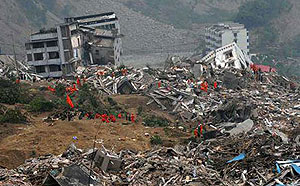Following the painful events in Haiti, I regret to remind the rest of earth’s inhabitants that, the disaster was certainly not the first and neither will it be the last. When nature strikes, its impact is far greater than the avoidable wars that many countries are currently fighting, yet it still startles me how disaster preparedness is treated as if it is a luxury by many African countries.


Following the painful events in Haiti, I regret to remind the rest of earth’s inhabitants that, the disaster was certainly not the first and neither will it be the last.
When nature strikes, its impact is far greater than the avoidable wars that many countries are currently fighting, yet it still startles me how disaster preparedness is treated as if it is a luxury by many African countries.
The 7.0 magnitude earthquake estimated to have killed over 200,000 people in Haiti dwarfs the 2,973 people who perished after terrorists crushed planes into the twin towers. This means that nature can mean to be incomparable when it comes to instantaneously destroying humanity.
"Woefully inadequate”, as Achin Steiner, the executive director of the UN Environment Project chose to call it, the state of Africa’s disaster preparedness seems to be a lone factor which has never been given the attention it requires.
Despite this, African countries are able to purchase more AK47s and tankers to take care of internal and external enemies without any considerable attempt aimed at strengthening their disaster preparedness departments.
This in my view is because armed conflict threatens the leaders’ grip on power; therefore, to them it’s a more important priority to battle against rebels rather than prevent natural disasters from greatly impacting the mainly poor citizens.
Take for example the DRC experience. The government has been somewhat successful at averting the numerous rebels from taking over power at the capital, yet it needed extreme foreign assistance to attend to Mt. Nyiragongo eruption in 2002.
The country with its vast wealth in minerals can afford to buy a jet for its president but not even two firefighter helicopters. This is just one out of a million cases which depict Africa’s invisible disaster preparedness responsibilities.
If anything, the seriousness in the death toll brought about my dangerous floods, forest fires and volcanic eruptions should cause governments to list disaster preparedness first on their budget every year.
This is all in the assumption that everybody concurs that a citizen’s safety must be given first priority above the usual newspaper headliners such as, strong investments in fair presidential elections.
Despite the fact that many African countries are growing economically, disaster preparedness is still shamefully funded peanuts, the systems are completely inefficient and almost no research is carried out to get the relevant data for planning risk reduction.
Therefore, you find lots of Africans ignorantly living in areas prone to dangerous natural strikes simply because the government does not have the capability to warn them.
According to Ali Mohamed, Kenya’s permanent secretary in the government’s special programmes ministry, the cost of response to the 1999-2001 Kenyan drought cost US$340 million, yet it would have cost half that amount had there been an effective disaster management system in place.
Just like in Kenya, the common lack of information which helps in climate prediction is not a surprising feat in Africa.
Governments assume that being projective is a waste of resources and time, so they prefer to act only when disaster strikes, which in the end proves more costly than they would have guessed.
If you ask me, this is one of the giant reasons why Africa is still heavily nourishing on aid. You will find even the most pan-African states going against their strong beliefs to beg for donor assistance when natural disaster hits.
It’s not a case of lacking funds that makes Africa unable to act; it’s rather the lack of commitment, coupled with the relaxed overlooking of the situation.
When you carefully listen to presidential candidates campaigning, they will promise the learned people to increase investments and then promise the poor to reduce poverty, but not even one will mention anything about protecting the voters’ lives from natural disasters.
Global warming is speedily becoming a reality with the increased pollution of the world through rapid industrialization and urbanization.
The only good thing that came from the Climate meeting in Copenhagen was nice diplomatic photo shots for the press, not solutions.
Not a lot of emphasis was put towards helping Africa be well prepared against natural phenomena.
This means that natural disasters are just waiting to happen, if not increase, and Africa has to stand up on its feet to protect its citizens on its own.
Policies and laws that aim to protect the environment should be implemented instead of just appearing in the constitution.
Africa’s desire to develop through industrialization and mechanization of agriculture is genuinely an excellent idea. However, countermeasures against land degradation and air pollution should be implemented also, so that Africa can safe guard whatever they will achieve in the industrialization process from being destroyed through the work of unregulated industries.
Hopefully in the forthcoming 2010 budget, we will witness a change in precedence, whereby, disaster preparedness will be given full consideration and funding unlike in the past.
Ends


